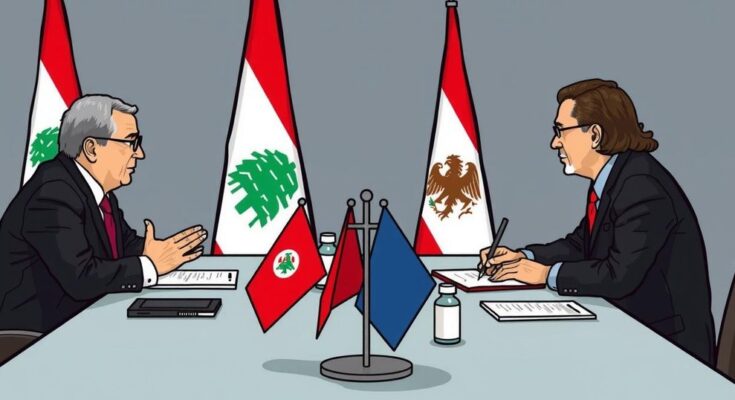Lebanese leaders engaged in discussions to elect a new president as the country has not had one for over two years amid political turmoil. Army Chief Joseph Aoun emerges as a frontrunner, although consensus remains elusive due to political divisions. External diplomatic pressures from France and the U.S. have intensified the urgency for electing a leader to initiate reforms amidst a significant financial crisis.
Lebanese political leaders convened for discussions on Wednesday, just before a parliamentary session aimed at electing a new president. The country, enduring a profound economic and political crisis, has lacked a presidential figure for over two years, primarily due to deep-seated divisions between the Shiite group Hezbollah and its adversaries. Amid this amid turmoil, Army Chief Joseph Aoun is viewed as a potential candidate, supported by those who believe he could facilitate military deployment in southern Lebanon under a ceasefire agreement with Israel.
Despite Hezbollah’s diminished influence post-war, achieving consensus among various factions remains uncertain, exemplified by reluctance from some parties to support Aoun. The divided political landscape in Lebanon, shaped by a history of civil discord from 1975-1990, highlights the necessity for an agreement before a successful vote can occur. The urgency for a decisive leader has been emphasized by external players, including French envoy Jean-Yves Le Drian and U.S. envoy Amos Hochstein, who have urged the Lebanese leadership to seize the moment and come together politically.
Aoun’s backing appears to be bolstered by the United States, with lesser support from France and Saudi Arabia, as they strive for much-needed reforms in a nation grappling with financial instability since 2019. Caretaker Prime Minister Najib Mikati expressed optimism about electing a president, stating, “I am pleased that God willing tomorrow we will have a president,” suggesting a potential shift from the current political impasse.
Lebanon’s constitution mandates that the president be a Maronite Christian, requiring backing from prominent Christian factions, which continues to complicate the process. The Lebanese Forces party is expected to announce their support for a single candidate, although uncertainty remains regarding whether that will be Joseph Aoun. Other contenders include Gebran Bassil and Samir Geagea, among others.
Critics, however, have accused Hezbollah of obstructing the election process. Despite significant setbacks, including the loss of their longtime leader, the dynamics surrounding Hezbollah’s influence on the presidential election remain complex. As the nation awaits the outcome, many Lebanese citizens express their desire for a leader genuinely representative of their needs and aspirations, reflecting the broader struggle for authentic governance in Lebanon.
Lebanon is currently facing a profound political and economic crisis which has left the nation without a president for over two years. This situation is compounded by divisions among political factions, notably between Hezbollah and its opponents. The political framework in Lebanon often necessitates consensus among various stakeholders, especially within the context of the country’s multi-confessional system, which designates the president’s role based on religious affiliation. The external pressures from nations such as France and the United States have added urgency to the electoral process, as various factions grapple with internal divisions and the overarching need for reform, particularly in light of the financial crisis that emerged in 2019.
In summary, Lebanon’s ongoing efforts to elect a new president are characterized by deep political divisions and external diplomatic pressures. With crucial players such as Joseph Aoun in the running and varying degrees of support from international powers, the coming parliamentary session is crucial. Numerous challenges remain, including resistance from opposing factions and potential alterations to the constitution. The outcome of this electoral endeavor will significantly influence Lebanon’s trajectory during a time of critical need for reform and stable governance.
Original Source: www.barrons.com




